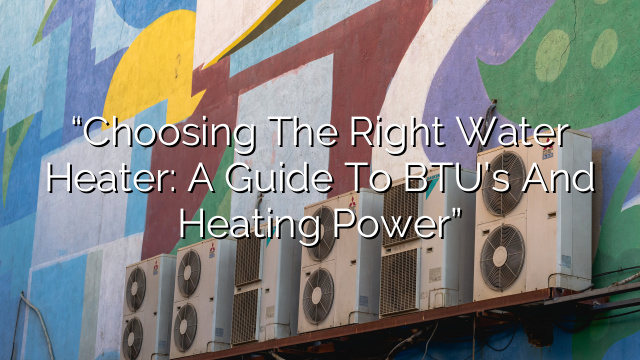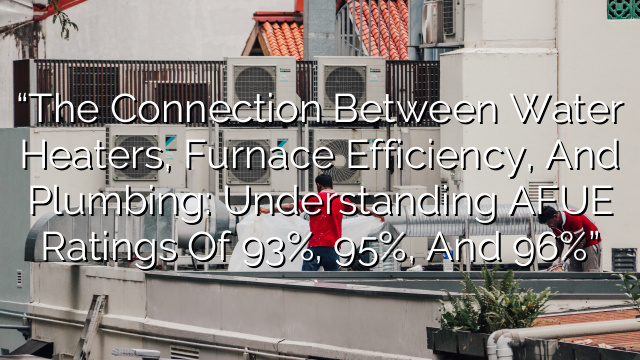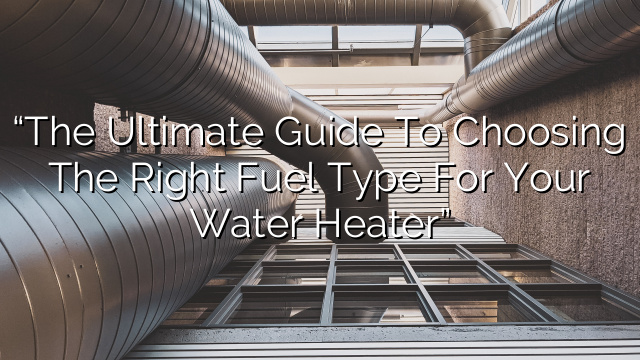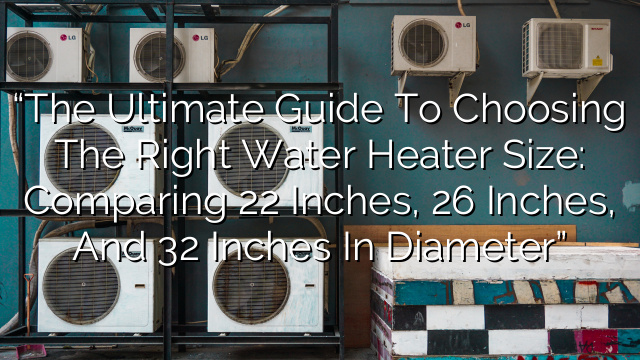Choosing the Right Water Heater: A Guide to BTU’s and Heating Power
When it comes to choosing a water heater, one important factor to consider is the BTU rating and heating power. BTU, or British Thermal Unit, is the unit of measurement for the amount of heat needed to raise the temperature of one pound of water by one degree Fahrenheit. The higher the BTU rating, the greater the heating power of the water heater. In this guide, we will discuss the different BTU ranges available for water heaters and help you select the right one for your needs.
Water Heaters
Before diving into the BTU ratings, it’s essential to understand the types of water heaters available in the market. There are primarily two types:
- Storage Tank Water Heaters: These water heaters store and heat a specific amount of water in a tank. They are the most common type of water heaters found in households.
- Tankless Water Heaters: Also known as on-demand water heaters, these units heat water as it flows through the device. They do not have a storage tank and only heat water when needed.
Both types of water heaters come in different sizes and BTU ratings, allowing you to choose the one that suits your hot water needs.
Heating BTU’s
The BTU rating of a water heater indicates its heating power and determines how quickly it can heat water. The BTU rating range for water heaters commonly available in the market is as follows:
- 60,000-69,999 BTU: This range is suitable for small households with low to moderate hot water demands. It can efficiently serve a single bathroom or a small apartment.
- 80,000-89,999 BTU: Water heaters in this range are ideal for medium-sized households with average hot water usage. They can serve multiple bathrooms and kitchens simultaneously.
- 100,000-149,999 BTU: This range caters to larger households or those with higher hot water demands. It provides better performance and faster recovery times.
- 150,000-199,999 BTU: Water heaters in this range are suitable for commercial applications or larger homes with extensive hot water needs. They offer a high flow rate and quick recovery times.
- 200,000-249,999 BTU: Designed for commercial or industrial settings, water heaters in this range are capable of providing hot water to multiple units simultaneously.
- 250,000-299,999 BTU: Similar to the previous range, this one is also suitable for large-scale commercial applications where a significant amount of hot water is required.
- 300,000 BTU and Up: These water heaters are built for heavy-duty commercial or industrial use. They can handle extensive hot water demands in large facilities.
When choosing a water heater, consider factors such as the number of bathrooms and kitchens in your home, the average hot water usage, and your future needs. Selecting a water heater with a higher BTU rating than required will ensure you have enough heating power to meet your needs.
FAQs
Q: What if I choose a water heater with a lower BTU rating?
A: If you choose a water heater with a lower BTU rating than required, it may struggle to provide sufficient hot water during peak demand times. You may experience longer recovery periods or lukewarm water. It’s recommended to select a water heater within the appropriate BTU range for your household’s needs.
Q: Can I install a commercial water heater in my home?
A: While it’s technically possible to install a commercial water heater in a home, it is generally not recommended. Commercial water heaters have higher BTU ratings and flow rates, which may exceed the needs of a typical residential setting. They can also be more expensive to purchase and install.
Q: Are tankless water heaters more efficient than storage tank water heaters?
A: Tankless water heaters are generally more energy-efficient than storage tank water heaters. Since they only heat water on demand, they don’t experience standby heat loss like storage tank water heaters. However, the initial cost of tankless water heaters is typically higher than traditional storage tank units.
Q: Can I install a tankless water heater in any home?
A: While tankless water heaters offer many advantages, they may not be suitable for every home. Some older homes may require electrical or plumbing upgrades to accommodate a tankless unit. Additionally, homes with very high hot water demands may require multiple tankless units to meet the needs adequately.
Q: How long do water heaters typically last?
A: The lifespan of a water heater depends on various factors, including usage, maintenance, and water quality. On average, tankless water heaters can last up to 20 years, while storage tank water heaters have a lifespan of around 10-15 years.
Choosing the right water heater for your home or commercial space is crucial for ensuring a reliable and efficient hot water supply. Consider the BTU rating and heating power of the water heater to select the appropriate unit for your specific needs. With the right choice, you can enjoy a consistent supply of hot water without any inconvenience or disruption.




